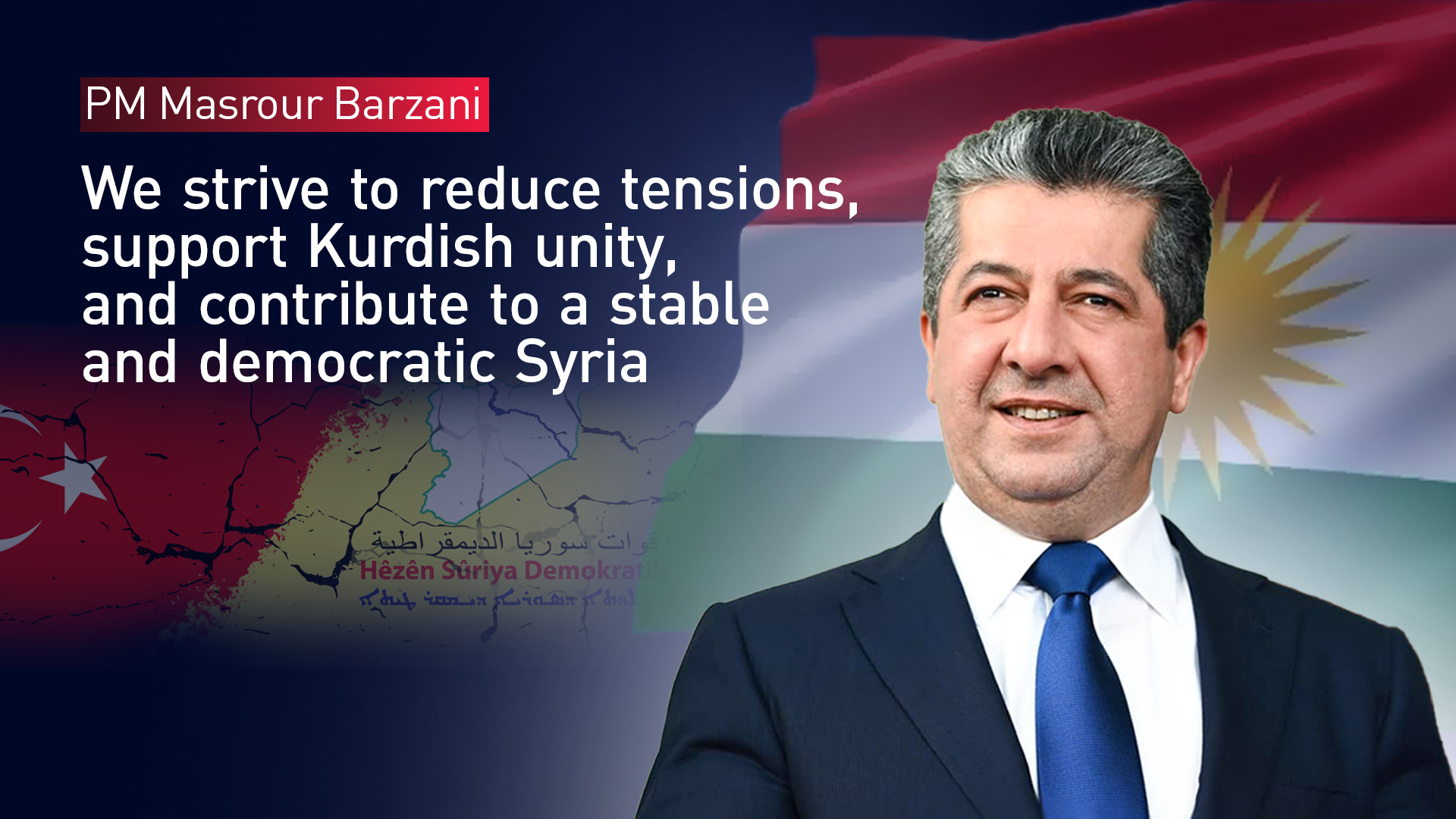Kurdistan Region’s Prime Minister Discuses Mediation, Kurdish Unity, and Syria’s Uncertain Future
Erbil advised Syrian Kurdish leaders to develop a structured mechanism to engage with Damascus, ensuring that Kurdish rights are safeguarded within a broader Syrian political framework.

ERBIL (Kurdistan24) – Prime Minister of the Kurdistan Region, Masrour Barzani, addressed key regional dynamics in an exclusive interview with al-Arabia news channel, highlighting mediation efforts between Turkey and Kurds in Rojava, the importance of Kurdish unity, and the broader political landscape in Syria.
He also shed light on his recent meeting with Syrian Foreign Minister Asaad Shibani and shared his perspective on the future of the Kurdish cause in the region.
Erbil’s Role in De-escalation Efforts Between Turkey and Kurds in Rojava
Prime Minister Barzani acknowledged the Kurdistan Region’s concerns regarding developments in Syria, given its direct geographical proximity and the presence of a significant Kurdish population across the border.
He stressed the need for stability and peace, not only for the Kurdish people but for all Syrians, emphasizing that Erbil has sought to play a constructive role in de-escalating tensions between Turkey and the Syrian Democratic Forces (SDF).
“In our discussions with Turkish leaders, including President Recep Tayyip Erdogan, we had very frank and open conversations about the current situation. There was a mutual understanding that de-escalation is necessary, and that time should be given to allow for peaceful solutions,” Barzani stated.
He also recognized Turkey’s security concerns regarding the presence of the Kurdistan Workers’ Party (PKK) in Syria, which has become a point of contention in the region.
“The key to progress is reducing tensions, ensuring that Syrian Kurds distance themselves from the PKK, and avoiding actions that would jeopardize the entire Kurdish population due to external conflicts,” he added.
Mazloum Abdi’s Visit to Erbil and Kurdish Unity
Barzani confirmed that Mazloum Abdi, the General Commander of the SDF, was invited to Erbil, where he met with President Masoud Barzani. During these discussions, President Barzani encouraged Kurdish factions to set aside their differences and establish a united front.
“A united Kurdish position would strengthen their influence in pursuing peaceful and sustainable solutions for Syria’s future,” Barzani emphasized.
He also noted that Erbil advised Rojava Kurdish leaders to develop a structured mechanism to engage with Damascus, ensuring that Kurdish rights are safeguarded within a broader Syrian political framework.
Barzani’s Meeting with Syrian Foreign Minister Asaad Shibani
Addressing his recent closed-door meeting with Syrian Foreign Minister Asaad Shibani in Davos, Barzani clarified that there were no hidden agendas, and the discussions focused on the importance of a peaceful resolution to the Syrian crisis.
“There were no secrets in our meeting. We spoke about the need for stability and a political transition that ensures the rights of all Syrians—Kurds, Alawites, Druze, and others. It is not our role to dictate what the Kurds in Syria should do; rather, they must determine their own future in a way that is sustainable and beneficial for Syria as a whole,” he explained.
Kurdistan Region’s Stance on the Syrian Democratic Forces
When asked about the relationship between the SDF and Damascus, Barzani clarified that while the SDF plays an important role, it does not represent the entire Kurdish population in Syria.
“There are multiple Kurdish political factions in Syria, and it is important that all are included in discussions about Syria’s future,” he noted. “Damascus must engage with all Kurdish voices, not just the SDF.”
Barzani urged the SDF to cooperate with other Kurdish factions, ensuring that the broader Kurdish interests are represented and that their vision aligns with an inclusive political process.
The Future of the Kurdish Cause and Regional Relations
When asked about the long-standing aspiration for an independent Kurdish state, Barzani offered a nuanced perspective, stating that the treatment of Kurds in the countries where they reside will ultimately shape their political future.
He drew a parallel with the European Union, highlighting how nations that once fought for sovereignty have now embraced integration and cooperation.
“If equality, justice, and respect are extended to the Kurds, societies can progress together. However, if Kurds continue to face injustice and oppression, their reactions will reflect that reality,” he asserted.
Final Messages to Regional Leaders
Barzani concluded the interview with messages directed at key figures in the region.
To Ahmed Al-Sharaa, Syria’s new leader, PM Barzani stated, “He must be a president for all Syrians and respect all communities.”
To Iraqi Prime Minister Mohammed Shia' Al-Sudani, PM Barzani said, “He must govern for all Iraqis and continue his positive relations with the Kurdistan Region.”
To Mazloum Abdi, PM Barzani asserted, “He should work toward Kurdish unity in Syria.”
To Abdullah Ocalan, PM Barzani stated, “I hope he will one day be released and that a peaceful solution for Kurds in Turkey is reached.”
A Diplomatic Approach to a Complex Regional Issue
Barzani’s statements reflect the Kurdistan Region’s commitment to diplomatic engagement in regional affairs, emphasizing peaceful mediation, Kurdish unity, and the necessity of political inclusivity in Syria.
As Syria navigates its transitional period, the role of Erbil in facilitating dialogue and fostering regional stability remains crucial in shaping the future of Kurdish and Syrian politics alike.